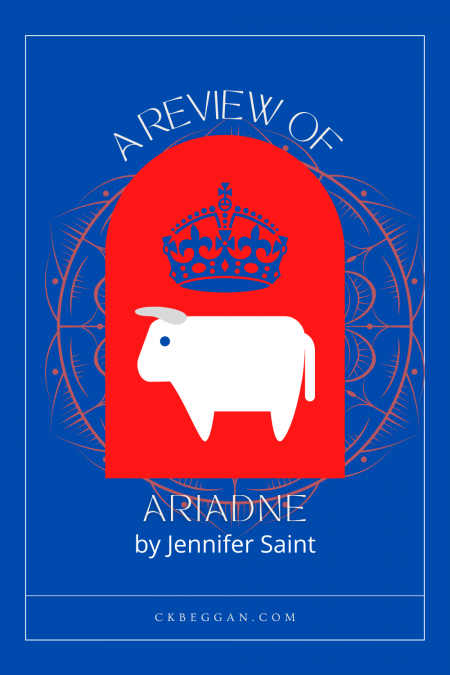
Oh, Ariadne. Not quite the hero you were advertised to be, and not forgettable, either. This story is uneven but has the ability to truly move the reader.
That’s because Ariadne the book contains beautiful, emotional prose and some aggravating plot points. This female-centered retelling of the Theseus and the Minotaur Greek myth was not what I expected. If you are also expecting a feminist retelling (as I did from the first few chapters), there are hints of that—often whole segments of it—but Ariadne and her sister Phaedra, two powerless princesses of Crete, never become the heroes of their own tale. This is a retelling sparing of no one, with the unforgiving nature of ancient Greece’s views on women (and perhaps on all women in general) on full display.
Ariadne ultimately portrays a woman who’s content with being a wife and mother—something not often featured in fantasy novels or myth retellings. As a child, she tries to see the human side of her half-bull brother, who becomes an infamous monster, caring for him as her mother did and illustrating her tender nature; yet she’s also willing to help Theseus kill Asterion to save herself. Though she debates about doing it, she acts swiftly when it’s asked of her.
Abandoned on Naxos and fearing both her father and the backlash of her betrayal, Ariadne commits to a life as Bacchus’s “priestess,” securing a safe place for herself. She later shares her home isle of Naxos with women escaping their lot in life, who live in peace on Bacchus’s isle.
Her sister Phaedra, on the other hand, becomes a true stateswoman (by convincing the men of Athens that she’s only sitting in for her husband, Theseus, who’s always off doing “heroic” deeds). She suffers from postpartum depression, which is written with convincing and sensitive detail.
However, Phaedra’s conclusion that she can’t really form an attachment to her sons because they resemble their father waters this down: her depression becomes a product of her hatred for her husband. Her political future goes down the drain when she insists on caring for her firstborn herself, so she can hide that she doesn’t love her baby. This, in turn, isolates her and makes her despair all the more. She’s stretched thin and becomes emotionally brittle, no longer the strong-willed and level-headed girl who wanted to save the tributes from Athens.
The men of the book are greedy, self-centered and often cruel, though nobody’s hands stay clean in the story (then again, it is a Greek myth). I kept rooting for Ariadne to be her own person for longer than a couple chapters, but alas, the origin story was against her. (For a different take, I highly recommend The King Must Die, by Mary Renault.) It can be jarring, though, comparing Ariadne’s moment of action to the rest of the book. By the time she chooses to act again, she’s clearly out of practice.
I wanted more from this book, but at the same time, I’m glad I read it. That’s because of the beautiful writing. The early chapters read like a crash-course in mythology, which can be slow at times, but enforces the message that women always pay the price for men’s deeds or other women’s jealousy. While that may be important to read—and again, Jennifer Saint’s writing!—it can also be trying.
To learn more about this author, visit jennifersaint.com.